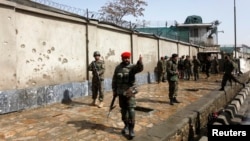ISLAMABAD —
A suicide bomber riding a bicycle blew himself up outside the Afghan Defense Ministry Saturday while U.S. Defense Secretary Chuck Hagel was in Kabul, but the Pentagon chief was nowhere near the scene. Another suicide bomber in the eastern city of Khost killed a policeman, children and other civilians. Together, the two incidents claimed 18 lives, and highlighted serious concerns about security in Afghanistan.
A spokesman for the international forces in Afghanistan, Charlie Stadtlander, said Hagel was not in the defense ministry at the time. He said there was no apparent connection between the bombing and the Pentagon chief's visit to the Afghan capital.
"I don't see any link at all. He was inside... a briefing and continued with his briefing," he said. "If you want to talk about the intentions of the attack, you're going to have to talk to the Taliban. We can't speak for their intentions."
The Taliban said it carried out the blast as a "message" for Hagel, who arrived Friday on his first visit to Afghanistan since taking over as President Barack Obama's defense secretarty. The United States and Afghanistan are trying to hammer out an agreement on how many international forces will remain in the country after U.S. troops and other NATO forces leave in 2014.
A Defense Ministry spokesman, General Zahir Azimi, told reporters that all bomb casualties were civilians.
He said a suicide bomber riding a bicycle detonated an explosives-filled vest he was wearing. The blast "unfortunately caused a number of civilian casualties," the spokesman said, but "no military personnel were killed."
A witness to the attack, Kamaludden described the scene outside the ministry Saturday morning.
"I was walking when the explosion happened," he said. "There were dead bodies and wounded people everywhere. And there were people firing, too."
There are concerns in Afghanistan about the nation's future after the end of 2014, the time when all international forces are due to have departed.
Despite an increase in the number of security forces Afghanistan has deployed, the latest incident highlights the fragility of security, even in protected areas of the capital.
Spring is beginning in Afghanistan, and the end of winter uusually marks an increase in insurgent activity by Taliban fighters.
A spokesman for the international forces in Afghanistan, Charlie Stadtlander, said Hagel was not in the defense ministry at the time. He said there was no apparent connection between the bombing and the Pentagon chief's visit to the Afghan capital.
"I don't see any link at all. He was inside... a briefing and continued with his briefing," he said. "If you want to talk about the intentions of the attack, you're going to have to talk to the Taliban. We can't speak for their intentions."
The Taliban said it carried out the blast as a "message" for Hagel, who arrived Friday on his first visit to Afghanistan since taking over as President Barack Obama's defense secretarty. The United States and Afghanistan are trying to hammer out an agreement on how many international forces will remain in the country after U.S. troops and other NATO forces leave in 2014.
A Defense Ministry spokesman, General Zahir Azimi, told reporters that all bomb casualties were civilians.
He said a suicide bomber riding a bicycle detonated an explosives-filled vest he was wearing. The blast "unfortunately caused a number of civilian casualties," the spokesman said, but "no military personnel were killed."
A witness to the attack, Kamaludden described the scene outside the ministry Saturday morning.
"I was walking when the explosion happened," he said. "There were dead bodies and wounded people everywhere. And there were people firing, too."
There are concerns in Afghanistan about the nation's future after the end of 2014, the time when all international forces are due to have departed.
Despite an increase in the number of security forces Afghanistan has deployed, the latest incident highlights the fragility of security, even in protected areas of the capital.
Spring is beginning in Afghanistan, and the end of winter uusually marks an increase in insurgent activity by Taliban fighters.





